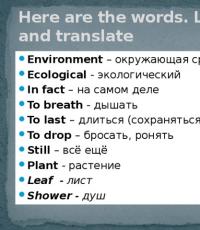Nature protection топик по английскому. Защита окружающей среды на английском языке
The protection of environment has become one of the most burning problems of our century.
Large cities with thousands of smoky industrial enterprises appear all over the world today. The by-products of their activity pollute the air we breathe, the water we drink, the soil we grow grain and vegetables. Every year the world industry pollutes the atmosphere with about 1000 million tons of dust and other harmful substances. Many cities suffer from smog. Vast forests are cut. Their disappearance upsets the oxygen balance. As a result some rare species of animals, birds, fish and plants disappear forever, a number of rivers and lakes dry up.
The pollution of air and the world"s ocean, destruction of the ozone layer is the result of man"s careless interaction with nature, a sign of ecological crisis.
The most horrible ecological disaster befell Ukraine and its people in the result of the accident at the Chernobyl nuclear power station in April 1986. A great damage has been done to ukraine"s agriculture, forests and people"s health.
Environmental protection is a global problem. That is why the most serious measures to create a universal system of ecological security should be taken.
The activity of various environmental organisations to help improve the situation. Among them are the Greenpeace and The Green Party.
If we are unable to learn to use the environment carefully and to protect it from destructive man"s activities, very soon we"ll have no world to live in.
VOCABULARY
environment - окружающая среда (окружение)
by-product ["baɪ,prɔdʌkt] - побочный (промежуточный) продукт
to pollute - загрязнять
harmful substances ["ha:mful "sʌbst(ə)nsɪs] - вредные вещества
to upset [ʌp"set] - нарушать
species ["spi:ʃɪz] - биол. виды
destruction - разрушение; разрушение
careless ["kɛəlɪs] interaction [,ɪntər"ækʃ(ə)n] - небрежная взаимодействие
to befall (befell, befallen) - случаться, петься
to take measures - принимать меры
QUESTIONS
1. What are the consequences of water, air pollution ?
2. Why did some species of animals, birds, fish and plants disappear forever ?
3. What is the result of man"s careless interaction with nature?
4. What do you know about the Chernobyl disaster?
5. What should people do if they want to live on the Earth ?
Защита окружающей среды
Защита окружающей среды - это одна из острейших проблем нашей современности.
Сейчас во всем мире многие крупные города с тысячами дымных индустриальных предприятий. Побочные продукты их деятельности загрязняют воздух, которым мы дышим, воду, которую мы пьем, почва, на которой мы выращиваем зерно и овощи. Ежегодно промышленные предприятия мира выбрасывают в атмосферу примерно тысячу миллионов тонн пыли и другие вредные вещества. Многие города страдают от густого тумана с дымом и копотью. Большие леса вырубаются. их исчезновение нарушает баланс кислорода. В результате некоторые редкие виды животных, птиц, рыб и растений исчезают навсегда, множество рек и озер высыхают.
Загрязнение воздуха и мирового океана, разрушение озонового слоя - это результат небрежной взаимодействия человека с природой, признаком экологического кризиса.
Самая ужасная экологическая катастрофа постигла Украину и ее людей вследствие аварии на Чернобыльской атомной электростанции в апреле 1986 года. Большой ущерб был нанесен сельскому хозяйству, лесам и здоровью людей Украины.
Защита окружающей среды - глобальная проблема. Именно поэтому должны быть приняты самые серьезные меры для создания всемирной системы экологической безопасности.
Деятельность различных организаций, направленная на защиту окружающей среды, помогает улучшать ситуацию. Среди таких организаций - Гринпис и Партия зеленых.
Если мы не научимся использовать окружающую среду бережно и защищать его от разрушительных действий человека, очень скоро нам негде будет жить.
Computers project that between now and the year of 2030 we are going to have increase of the average temperature between 1,5-4,5 Degrees C. Sea levels would rise by several metres, flooding coastal areas and ruining vast tracts of farmland. Huge areas would be infertile and become uninhabitable. Water contamination could lead to shortages of safe drinking water. It looks like the end of civilization on the Earth. For hundreds of thousands of years the human race has thriven in Earth’s environment. But now, at the end of the 20th century, we are at a crucial turning point. We have upset nature’s sensitive equilibrium releasing harmful substances into the air, polluting rivers and oceans with industrial waste and tearing up the countryside to accommodate our rubbish. These are the consequences of the development of civilization. We are to stop it by joint efforts of all the people of the world. The range of environmental problems is wide. But the matters of people’s great concern nowadays are atmosphere and climate changes, depletion of the ozone layer, freshwater resources, oceans and coastal areas, deforestation and desertification, biological diversity, biotechnology, health and chemical safety. United Nations Environment Programme (UNEP) concentrates its activities on these issues. Acid Rains One of the most alarming forms of air pollution is acid rain. It results from the release into the atmosphere of sulphur and nitrogen oxides that react with water droplets and return to earth in the form of acid rain, mist or snow. Acid rain iskilling forests (Nearly every species of tree is affected) It has acidified lakes and streams and they can’t support fish, wildlife, plants or insects. Depletion of the Ozone Layer The protective layer of the Earth, the ozone layer, which protects the Earth from the sun’s destructive UV (ultraviolet) rays, is being damaged by CFCs (chlorofluorocarbons). They are released by the daily use of industrial and household products: refrigerators, air conditioners, foam insulation, cleaning chemicals, food packaging. In the ozone layer they attack the ozone molecules making a «hole». This «hole» allows more UV rays to penetrate to the Earth. It increases the risk of skin cancer, weakens the immune system of people. Besides, UV rays influence the oceans, the growth of plankton, an essential part of the marine-life food chain in the negative way, reduce economically important-crops (rice, cotton, soy beans). The life cycle is going to be undermined by the ozone. Destruction of the Tropical Forest It’s generally agreed that the destruction of the tropical forest has a major impact on the world climate. The tropical rain forest is a natural recycler, provider and protector for our planet. It recycles carbon, nitrogen and oxygen, helps determine temperature, rainfall and other climatic conditions and supports the most diverse ecosystem in the world. Deforestation could cause one forth of all species on earth to vanish in the next 25 years. These forests in Amazonia, South-East Asia and West and Central Africa are being destroyed at an alarming rate of 42 million acres per year. Measures to Be Taken We have only a few years to attempt to turn things around. We must review our wasteful, careless ways, we must consume less, recycle more, conserve wildlife and nature, act according to the dictum «think locally, think globally, act locally». To my mind, we are obliged to remove factories and plants from cities, use modern technologies, redesign and modify purifying systems for cleaning and trapping harmful substances, protect and increase the greenery and broaden ecological education. These are the main practical measures, which must he taken in order to improve the ecological situation. Some progress has been already made in this direction. 159 countries-members of the UNO have set up environmental protection agencies. They hold conferences discussing ecological problems, set up environmental research centres and take practical urgent measures to avoid ecological catastrophe. There are numerous public organisations such as Greenpeace that are doing much to preserve environment. The 5th of June is proclaimed the World Environmental Day by the UNO and is celebrated every year.
In recent years the number of environmental problems has increased greatly. One of the most dangerous problems for our planet is global warming which means that most climates all over the world are changing and getting warmer. It happens because we burn too much petrol resources, such as oil and coal, and the Earth heats up. This process can cause melting of the polar ice and the sea level rising in the future. If the climate changes there will be floods, heavy storms or severe droughts in different areas of the world. Cutting down on exhaust fumes from vehicles could help solve this serious problem.
Our planet is overpopulated, that’s why we are using up our natural resources – they are not endless. So the scientists have started looking for some alternate forms of energy such as water, wind, sunlight and even tides. These resources are clean, natural and unlimited. I’m glad that modern automobile industries make hybrids which use electric or solar energy instead of petrol. It would definitely help protect our environment from pollution.
There are different kinds of environmental pollution: air pollution, water pollution, land pollution. Sadly, not all human beings realize or admit that we are the ones who cause these problems and we should be the first to stop them and protect our environment. Because of the industrial revolution the air is polluted with awful chemicals; seas and oceans are poisoned with oil spills. Many rare species of flora and fauna are threatened with extinction.
We should be proud to live on our wonderful planet and understand that the consequences of pollution might be terrible and affect us and our children later. We should start recycling things made of glass, paper, plastic and aluminium. We should stop smoking and plant as many trees as we can because they can give us more oxygen. We need to drive less and use public transport in order to reduce fuel burning. We are responsible for the situation.
Проблемы окружающей среды
В последние годы число проблем окружающей среды сильно возросло. Одной из самых опасных проблем для нашей планеты является глобальное потепление, которое означает изменение климата по всему миру и его потепление. Это происходит оттого, что мы сжигаем слишком много топливных ресурсов, таких как нефть и уголь, и Земля нагревается. Этот процесс может привести к таянию полярного льда и повышению уровня моря в будущем. Если изменится климат, произойдут наводнения, сильные штормы или жестокие засухи в разных частях света. Сокращение выхлопных газов транспортных средств могло бы способствовать разрешению этой серьезной проблемы.
Наша планета перенаселена, поэтому мы расходуем до предела наши природные ресурсы – они не бесконечны. Так ученые приступили к поискам альтернативных форм энергии, таких как вода, ветер, солнечный свет и даже приливы. Эти источники чисты, естественны и бесконечны. Я рад, что современная автомобильная промышленность выпускает гибриды, использующие электрическую или солнечную энергию вместо бензина. Это обязательно поможет защите нашей среды от загрязнения.
Существуют разные виды загрязнения окружающей среды: загрязнение воздуха, воды и почвы. К сожалению, не все люди осознают или признают, что именно мы создаем эти проблемы, и мы должны быть первыми, кто остановит их и защитит наше окружение. Из-за промышленной революции воздух загрязнен ужасными химикатами; моря и океаны отравлены разливами нефти. Многие редкие виды флоры и фауны находятся под угрозой вымирания.
Нам нужно гордиться тем, что мы живем на нашей замечательной планете, и следует понимать, что последствия загрязнения могут быть страшными и воздействовать на нас и наших детей позже. Нам нужно перерабатывать изделия из стекла, бумаги, пластика и алюминия. Нужно бросать курить и сажать как можно больше деревьев для того, чтобы они вырабатывали для нас больше кислорода. Мы должны меньше водить машины и стараться пользоваться общественным транспортом, чтобы снизить количество сжигаемого топлива. Мы ответственны за ситуацию.
Computers project that between now and the year of 2030 we are going to have increase of the average temperature between 1,5 — 4,5 Degrees C. Sea levels would rise by several metres, flooding coastal areas and ruining vast tracts of farmland. Huge areas would be infertile and become uninhabitable. Water contamination could lead to shortages of safe drinking water. It looks like the end of civilization on the Earth. For hundreds of thousands of years the human race has thriven in Earth"s environment.
But now, at the end of the 20th century, we are at a crucial turning point. We have upset nature"s sensitive equilibrium releasing harmful substances into the air, polluting rivers and oceans with industrial waste and tearing up the countryside to accommodate our rubbish. These are the consequences of the development of civilization. We are to stop it by joint efforts of all the people of the world. The range of environmental problems is wide.
But the matters of people"s great concern nowadays are atmosphere and climate changes, depletion of the ozone layer, freshwater resources, oceans and coastal areas, deforestation and desertification, biological diversity, biotechnology, health and chemical safety. United Nations Environment Programme (UNEP) concentrates its activities on these issues. Acid Rains One of the most alarming forms of air pollution is acid rain. It results from the release into the atmosphere of sulphur and nitrogen oxides that react with water droplets and return to earth in the form of acid rain, mist or snow.
Acid rain iskilling forests (Nearly every species of tree is affected) It has acidified lakes and streams and they can"t support fish, wildlife, plants or insects. Depletion of the Ozone Layer The protective layer of the Earth, the ozone layer, which protects the Earth from the sun"s destructive UV (ultraviolet) rays, is being damaged by CFCs (chlorofluorocarbons). They are released by the daily use of industrial and household products: refrigerators, air conditioners, foam insulation, cleaning chemicals, food packaging. In the ozone layer they attack the ozone molecules making a «hole». This «hole» allows more UV rays to penetrate to the Earth. It increases the risk of skin cancer, weakens the immune system of people.
Besides, UV rays influence the oceans, the growth of plankton, an essential part of the marine-life food chain in the negative way, reduce economically important-crops (rice, cotton, soy beans).
The life cycle is going to be undermined by the ozone. Destruction of the Tropical Forest It"s generally agreed that the destruction of the tropical forest has a major impact on the world climate. The tropical rain forest is a natural recycler, provider and protector for our planet. It recycles carbon, nitrogen and oxygen, helps determine temperature, rainfall and other climatic conditions and supports the most diverse ecosystem in the world. Deforestation could cause one forth of all species on earth to vanish in the next 25 years.
These forests in Amazonia, South-East Asia and West and Central Africa are being destroyed at an alarming rate of 42 million acres per year. Measures to Be Taken We have only a few years to attempt to turn things around. We must review our wasteful, careless ways, we must consume less, recycle more, conserve wildlife and nature, act according to the dictum «think locally, think globally, act locally».
Здесь Вы можете найти топик на английском языке: Nature Protection.
Nature Protection
Computers project that between now and the year of 2030 we are going to have increase of the average temperature between 1,5-4,5 Degrees C. Sea levels would rise by several metres, flooding coastal areas and ruining vast tracts of farmland. Huge areas would be infertile and become uninhabitable. Water contamination could lead to shortages of safe drinking water. It looks like the end of civilization on the Earth. For hundreds of thousands of years the human race has thriven in Earth"s environment. But now, at the end of the 20th century, we are at a crucial turning point. We have upset nature"s sensitive equilibrium releasing harmful substances into the air, polluting rivers and oceans with industrial waste and tearing up the countryside to accommodate our rubbish. These are the consequences of the development of civilization.
We are to stop it by joint efforts of all the people of the world. The range of environmental problems is wide. But the matters of people"s great concern nowadays are atmosphere and climate changes, depletion of the ozone layer, freshwater resources, oceans and coastal areas, deforestation and desertification, biological diversity, biotechnology, health and chemical safety. United Nations Environment Programme (UNEP) concentrates its activities on these issues. Acid Rains One of the most alarming forms of air pollution is acid rain. It results from the release into the atmosphere of sulphur and nitrogen oxides that react with water droplets and return to earth in the form of acid rain, mist or snow. Acid rain iskilling forests (Nearly every species of tree is affected) It has acidified lakes and streams and they can"t support fish, wildlife, plants or insects.
Depletion of the Ozone Layer The protective layer of the Earth, the ozone layer, which protects the Earth from the sun"s destructive UV (ultraviolet) rays, is being damaged by CFCs (chlorofluorocarbons). They are released by the daily use of industrial and household products: refrigerators, air conditioners, foam insulation, cleaning chemicals, food packaging. In the ozone layer they attack the ozone molecules making a «hole». This «hole» allows more UV rays to penetrate to the Earth. It increases the risk of skin cancer, weakens the immune system of people. Besides, UV rays influence the oceans, the growth of plankton, an essential part of the marine-life food chain in the negative way, reduce economically important-crops (rice, cotton, soy beans). The life cycle is going to be undermined by the ozone. Destruction of the Tropical Forest It"s generally agreed that the destruction of the tropical forest has a major impact on the world climate.
The tropical rain forest is a natural recycler, provider and protector for our planet. It recycles carbon, nitrogen and oxygen, helps determine temperature, rainfall and other climatic conditions and supports the most diverse ecosystem in the world. Deforestation could cause one forth of all species on earth to vanish in the next 25 years. These forests in Amazonia, South-East Asia and West and Central Africa are being destroyed at an alarming rate of 42 million acres per year. Measures to Be Taken We have only a few years to attempt to turn things around. We must review our wasteful, careless ways, we must consume less, recycle more, conserve wildlife and nature, act according to the dictum «think locally, think globally, act locally». To my mind, we are obliged to remove factories and plants from cities, use modern technologies, redesign and modify purifying systems for cleaning and trapping harmful substances, protect and increase the greenery and broaden ecological education. These are the main practical measures, which must he taken in order to improve the ecological situation. Some progress has been already made in this direction.
159 countries-members of the UNO have set up environmental protection agencies. They hold conferences discussing ecological problems, set up environmental research centres and take practical urgent measures to avoid ecological catastrophe. There are numerous public organisations such as Greenpeace that are doing much to preserve environment. The 5th of June is proclaimed the World Environmental Day by the UNO and is celebrated every year.





